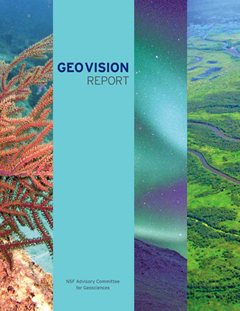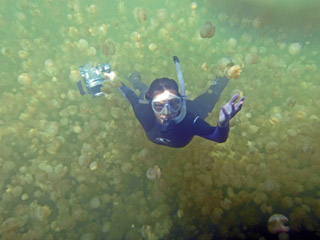Navigation
National Science Foundation Advisory Committee Offers New Vision for the Geosciences in Report "GEO Vision: Unraveling Earth's Complexities through the Geosciences"
Society stands at a crossroads. With growing problems such as resource depletion, energy sustainability, environmental degradation and climate change, can we protect the health of the planet while achieving widespread economic prosperity?
Society stands at a crossroads. With growing problems such as resource depletion, energy sustainability, environmental degradation and climate change, can we protect the health of the planet while achieving widespread economic prosperity?
 |
| For most of its history Earth has experienced vast alterations, states the report, in response to natural variations in our planet. Humans, however, are now emerging as the dominant agent of change. Credit: NSF Advisory Committee for Geosciences |
So asks a report released on October 15, 2009, by the National Science Foundation (NSF)'s Advisory Committee for Geosciences (AC-GEO): GEO Vision: Unraveling Earth's Complexities through the Geosciences.
For most of its history Earth has experienced vast alterations, states the report, in response to natural variations in our planet.
Humans, however, are now emerging as the dominant agent of change.
"It is essential going forward that we have the scientific tools and evidence to understand and anticipate how the Earth will be transformed in the future, and at what rate, in response to these growing pressures," says geoscientist George Davis of the University of Arizona, chair of the AC-GEO.
 |
| This artist's rendering shows the solar wind as it streaks by Earth. Credit: NASA |
"To identify these influences and their potential impacts requires an understanding of the Earth, its history, and its systems that's grounded in basic science--a science that probes and ultimately defines the Earth's character."
Such basic research is the domain of the geosciences, which seek to advance a better understanding of Earth and its systems, states the GEO Vision report.
In the United States, NSF is the sole research agency, believes the AC-GEO, with the disciplinary breadth to comprehensively address these diverse challenges. The AC-GEO, NSF's directorate for geosciences, has three divisions: atmospheric and geospace sciences; earth sciences; and ocean sciences.
 |
| Jellyfish and other small sea creatures drive large-scale mixing in the oceans.Credit: John Dabiri, Caltech |
"It is NSF's geosciences directorate that must engage other NSF directorates and external partners in an ambitious research program that furthers our understanding of Earth, and provides the basis for objective and sound policy formulation and decision-making," says Arden L. Bement, Jr., NSF director.
The challenges ahead for the geosciences,
the advisory committee found, are:
- understanding and forecasting the behavior of a complex and evolving Earth system;
- reducing vulnerability and sustaining life; and
- growing the geosciences workforce of the future.
The members of the AC-GEO believe that it's possible to meet these challenges, and to realize a GEO Vision of fostering a sustainable future, through a better understanding of our complex and changing planet.
"Earth is a dynamic marvel of complexity and beauty," says Tim Killeen, NSF assistant director for geosciences. "We as geoscientists must work to meet the challenge of understanding its many facets, and use that knowledge to advance our stewardship of its systems. The AC-GEO's report could not be more timely."
Society as a whole must make wise decisions regarding environmental and resource management, according to GEO Vision, using a grounded and rational set of guidelines.
Scientists and engineers will be called upon in the future to supply the scientific insights and predictive capabilities required to inform key policy decisions, many with long-lasting effects.
"Leading many of those discussions will be geoscientists," states the report, "who will share their understanding of the Earth system with the public and with decision-makers, providing the scientific knowledge that will ultimately guide society as it comes to understand its evolving relationship with the planet."
The AC-GEO's recommendations are to:
- Sustain and nurture fundamental geosciences disciplinary programs;
- Reach out in bold new directions, engaging and incorporating other disciplines;
- Embrace a culture that recognizes that transformational research involves an element of risk;
- Invest wisely and responsibly manage the next generation of tools, technologies, and techniques, including advanced computation to enable cutting-edge research;
- Communicate the critical role the geosciences play in reducing risks from natural hazards;
- Build effective and enduring partnerships within NSF as well as with other federal agencies, the private sector, international organizations, and with other institutions outside U.S. borders;
- Recognize the explicit need for the geosciences to adopt the challenge of increasing the resiliency of natural systems;
- Build bridges between geoscience researchers and the K-12 classroom to promote early childhood and young-adult understanding of geosciences concepts;
- Create a broad and diverse cadre of geosciences researchers who can use creative approaches to geosciences education and literacy at all levels;
- Convey central, and potentially pivotal, geosciences research and findings to policymakers and thought leaders for building a sustainable future.
"We as a society face a daunting task," says Killeen. "Through the help of the AC-GEO, we will make great strides in realizing a new vision for the geosciences--and for the future of our planet."
This article is from an NSF release of October 15, 2009.
Related Websites:
NSF Directorate for Geosciences
![]()
About GEO
The Directorate for Geosciences (GEO) is one of seven research arms within the National Science Foundation. Its mission is to support research in the atmospheric, earth, and ocean sciences. As the principal source of federal funding for university-based fundamental research in the geosciences, GEO addresses the nation's need to understand, predict, and respond to environmental events and changes to use Earth's resources wisely. Basic research in the geosciences advances scientific knowledge of Earth's environment, including resources such as water, energy, minerals, and biological diversity. GEO-supported research also advances our ability to predict natural phenomena of economic and human significance, such as climate changes, weather, earthquakes, fish-stock fluctuations, and disruptive events in the solar-terrestrial environment.
Note:
A related article on the Horizon Solutions Site is:
Millions of Jellyfish in Jellyfish Lake Found to “Biomix,” Churning Nutrients of the Lake
 |
"Biomixing" by floating animals churns waters in oceans, seas, lakes: Through this process, jellyfish and other zooplankton--where they're abundant, as they are in Jellyfish Lake--may in some way affect Earth's climate. "Biomixing may be a form of 'ecosystem engineering' by jellyfish, and a major contributor to carbon sequestration, especially in semi-enclosed coastal waters," says marine scientist Michael Dawson.
May 12, 2009, 2:24pm
Search
Latest articles
Agriculture
- World Water Week: Healthy ecosystems essential to human health: from coronavirus to malnutrition Online session Wednesday 24 August 17:00-18:20
- World Water Week: Healthy ecosystems essential to human health: from coronavirus to malnutrition Online session Wednesday 24 August 17:00-18:20
Air Pollution
- "Water and Sanitation-Related Diseases and the Changing Environment: Challenges, Interventions, and Preventive Measures" Volume 2 Is Now Available
- Global Innovation Exchange Co-Created by Horizon International, USAID, Bill and Melinda Gates Foundation and Others
Biodiversity
- It is time for international mobilization against climate change
- World Water Week: Healthy ecosystems essential to human health: from coronavirus to malnutrition Online session Wednesday 24 August 17:00-18:20
Desertification
- World Water Week: Healthy ecosystems essential to human health: from coronavirus to malnutrition Online session Wednesday 24 August 17:00-18:20
- UN Food Systems Summit Receives Over 1,200 Ideas to Help Meet Sustainable Development Goals
Endangered Species
- Mangrove Action Project Collaborates to Restore and Preserve Mangrove Ecosystems
- Coral Research in Palau offers a “Glimmer of Hope”
Energy
- Global Innovation Exchange Co-Created by Horizon International, USAID, Bill and Melinda Gates Foundation and Others
- Wildlife Preservation in Southeast Nova Scotia
Exhibits
- Global Innovation Exchange Co-Created by Horizon International, USAID, Bill and Melinda Gates Foundation and Others
- Coral Reefs
Forests
- NASA Satellites Reveal Major Shifts in Global Freshwater Updated June 2020
- Global Innovation Exchange Co-Created by Horizon International, USAID, Bill and Melinda Gates Foundation and Others
Global Climate Change
- It is time for international mobilization against climate change
- It is time for international mobilization against climate change
Global Health
- World Water Week: Healthy ecosystems essential to human health: from coronavirus to malnutrition Online session Wednesday 24 August 17:00-18:20
- More than 400 schoolgirls, family and teachers rescued from Afghanistan by small coalition
Industry
- "Water and Sanitation-Related Diseases and the Changing Environment: Challenges, Interventions, and Preventive Measures" Volume 2 Is Now Available
- Global Innovation Exchange Co-Created by Horizon International, USAID, Bill and Melinda Gates Foundation and Others
Natural Disaster Relief
- STOP ATTACKS ON HEALTH CARE IN UKRAINE
- Global Innovation Exchange Co-Created by Horizon International, USAID, Bill and Melinda Gates Foundation and Others
News and Special Reports
- World Water Week: Healthy ecosystems essential to human health: from coronavirus to malnutrition Online session Wednesday 24 August 17:00-18:20
- STOP ATTACKS ON HEALTH CARE IN UKRAINE
Oceans, Coral Reefs
- World Water Week: Healthy ecosystems essential to human health: from coronavirus to malnutrition Online session Wednesday 24 August 17:00-18:20
- Mangrove Action Project Collaborates to Restore and Preserve Mangrove Ecosystems
Pollution
- Zakaria Ouedraogo of Burkina Faso Produces Film “Nzoue Fiyen: Water Not Drinkable”
- "Water and Sanitation-Related Diseases and the Changing Environment: Challenges, Interventions, and Preventive Measures" Volume 2 Is Now Available
Population
- "Water and Sanitation-Related Diseases and the Changing Environment: Challenges, Interventions, and Preventive Measures" Volume 2 Is Now Available
- "Water and Sanitation-Related Diseases and the Changing Environment: Challenges, Interventions, and Preventive Measures" Volume 2 Is Now Available
Public Health
- Honouring the visionary behind India’s sanitation revolution
- Honouring the visionary behind India’s sanitation revolution
Rivers
- World Water Week: Healthy ecosystems essential to human health: from coronavirus to malnutrition Online session Wednesday 24 August 17:00-18:20
- Mangrove Action Project Collaborates to Restore and Preserve Mangrove Ecosystems
Sanitation
- Honouring the visionary behind India’s sanitation revolution
- Honouring the visionary behind India’s sanitation revolution
Toxic Chemicals
- "Water and Sanitation-Related Diseases and the Changing Environment: Challenges, Interventions, and Preventive Measures" Volume 2 Is Now Available
- Actions to Prevent Polluted Drinking Water in the United States
Transportation
- "Water and Sanitation-Related Diseases and the Changing Environment: Challenges, Interventions, and Preventive Measures" Volume 2 Is Now Available
- Urbanization Provides Opportunities for Transition to a Green Economy, Says New Report
Waste Management
- Honouring the visionary behind India’s sanitation revolution
- Honouring the visionary behind India’s sanitation revolution
Water
- Honouring the visionary behind India’s sanitation revolution
- Honouring the visionary behind India’s sanitation revolution
Water and Sanitation
- Honouring the visionary behind India’s sanitation revolution
- Honouring the visionary behind India’s sanitation revolution

